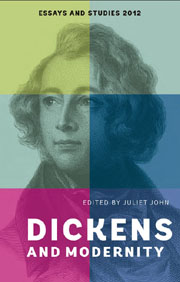Book contents
- Frontmatter
- Contents
- LIST OF ILLUSTRATIONS
- ACKNOWLEDGEMENTS
- NOTES ON THE CONTRIBUTORS
- INTRODUCTION
- 1 THE DICKENS TAPE: AFFECT AND SOUND REPRODUCTION IN THE CHIMES
- 2 DICKENS, SEXUALITY AND THE BODY; OR, CLOCK LOVING: MASTER HUMPHREY'S QUEER OBJECTS OF DESIRE
- 3 TEXTS, PARATEXTS AND ‘E-TEXTS’: THE POETICS OF COMMUNICATION IN DICKENS'S JOURNALISM
- 4 CORPUS STYLISTICS – DICKENS, TEXT-DRIVENNESS AND THE FICTIONAL WORLD
- 5 THINGS, WORDS AND THE MEANINGS OF ART
- 6 DICKENS AND THE CIRCUS OF MODERNITY
- 7 THE OLIVER! PHENOMENON; OR, ‘PLEASE, SIR, WE WANT MORE AND MORE!’
- 8 ‘WOW! SHE'S A LESBIAN. GOT TO BE!’: RE-READING/RE-VIEWING DICKENS AND NEO-VICTORIANISM ON THE BBC
- 9 OUT OF PLACE: DAVID COPPERFIELD'S IRRESOLVABLE GEOGRAPHIES
- 10 AFTERWORD: THE 2012 BICENTENARY
- Index
7 - THE OLIVER! PHENOMENON; OR, ‘PLEASE, SIR, WE WANT MORE AND MORE!’
Published online by Cambridge University Press: 05 February 2013
- Frontmatter
- Contents
- LIST OF ILLUSTRATIONS
- ACKNOWLEDGEMENTS
- NOTES ON THE CONTRIBUTORS
- INTRODUCTION
- 1 THE DICKENS TAPE: AFFECT AND SOUND REPRODUCTION IN THE CHIMES
- 2 DICKENS, SEXUALITY AND THE BODY; OR, CLOCK LOVING: MASTER HUMPHREY'S QUEER OBJECTS OF DESIRE
- 3 TEXTS, PARATEXTS AND ‘E-TEXTS’: THE POETICS OF COMMUNICATION IN DICKENS'S JOURNALISM
- 4 CORPUS STYLISTICS – DICKENS, TEXT-DRIVENNESS AND THE FICTIONAL WORLD
- 5 THINGS, WORDS AND THE MEANINGS OF ART
- 6 DICKENS AND THE CIRCUS OF MODERNITY
- 7 THE OLIVER! PHENOMENON; OR, ‘PLEASE, SIR, WE WANT MORE AND MORE!’
- 8 ‘WOW! SHE'S A LESBIAN. GOT TO BE!’: RE-READING/RE-VIEWING DICKENS AND NEO-VICTORIANISM ON THE BBC
- 9 OUT OF PLACE: DAVID COPPERFIELD'S IRRESOLVABLE GEOGRAPHIES
- 10 AFTERWORD: THE 2012 BICENTENARY
- Index
Summary
On thursday 30 june 1960, a hummable musical ‘freely adapted’ from Oliver Twist (though also inspired by a chocolate bar) ‘sizzled’ onto the stage of the New Theatre, London, launching the star careers of standup comedian and cabaret artist Ron Moody (Fagin), night-club singer Georgia Brown (Nancy), and a string of musical Artful Dodgers, including Davy Jones (later one of the pop group the Monkees, who performed as the Dodger on ‘The Ed Sullivan Show’ the same night the Beatles made their American TV debut), the rock star Phil Collins (‘the loudest Dodger’, his child-actor-agent mother proudly recalled), the Small Faces singer-guitarist Steve Marriott, and the teen actor Jack Wild (who went wild, as ex-Dodgers were wont to do). ‘The curtain-calls went on and on’, recalled Moody, ‘there was a kind of electrical magnetism around the theatre.’ ‘A triumph … rush for seats’ raved the Evening Standard; ‘A magical musical’, sang the Sunday Dispatch; ‘A whopping welcome winner’, proclaimed the Daily Sketch. On 20 November 1965, on its 2,284th performance, Oliver! became the longest-running musical in British theatre history; at its final, 2,618th performance, there were an astonishing twenty-five curtain calls. On 14 November 1964, Oliver! became the longest-running British musical ever seen on Broadway. (Records encapsulate both the legends and the economics of theatre history.) Translated to film, at huge cost, the last of the classic screen musicals, in 1968, Oliver! won six Oscars.
- Type
- Chapter
- Information
- Dickens and Modernity , pp. 150 - 170Publisher: Boydell & BrewerPrint publication year: 2012

